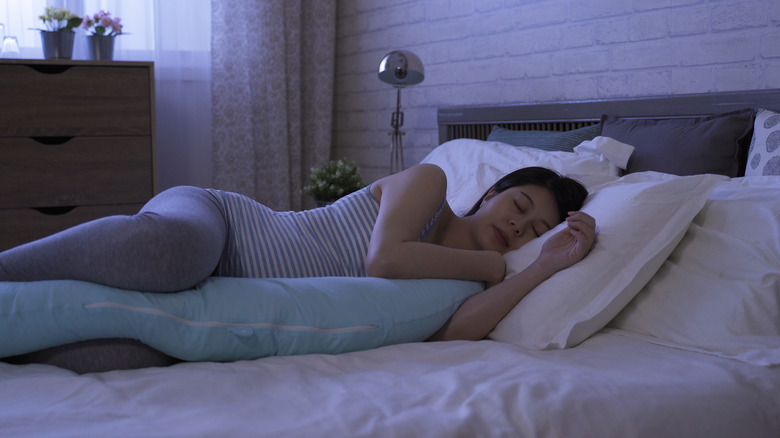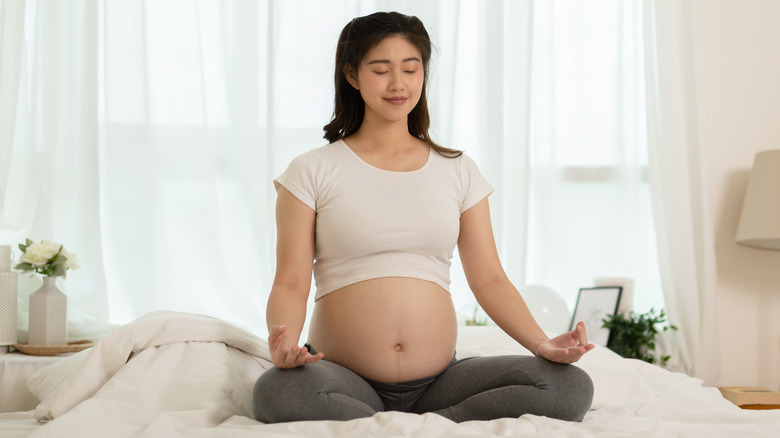Simple Tricks To Improve Sleep When Pregnant
Pregnancy is an incredibly transformative experience that often brings with it some unpleasant symptoms such as heartburn, sore breasts, and trouble sleeping. So many women deal with insomnia during pregnancy that a 2020 cross-sectional study reported that between 46 and 78% of pregnant women experience sleep disorders. This number bumped up to 80% by the time the third trimester rolled around.
The Sleep Foundation explains that there are many reasons behind the famous pregnancy insomnia. Fluctuating hormone levels, nausea, leg cramps, trouble breathing, general physical discomfort, and a higher body temperature are all factors in reducing quality and quantity of sleep during pregnancy. Once the baby is big enough, pregnant women may also find themselves literally being awakened from within by forceful kicks.
The Sleep Foundation notes that obstructive sleep apnea, restless legs syndrome, and gastroesophageal reflux disorder (GERD) can all affect women during pregnancy. If you're pregnant and having trouble sleeping, it's important to address the issue and try to find ways to improve sleep, as doing so will lower your risk of developing high blood pressure or gestational diabetes while greatly benefiting both maternal and fetal health. Check out these simple tricks for a better night's sleep.
Cool down your bedroom
Feeling overheated and experiencing hot flashes during pregnancy is completely normal — the metabolic and hormonal changes taking place are to blame for this, as explained by Verywell Family. Gynecologist Heather Johnson points out that pregnant women have a higher body temperature overall than their non-pregnant counterparts. "Pregnant women's bodies are working harder, creating more heat to dispel, even when they're sitting still," she explains.
Overheating at night may interfere with your ability to sleep. In fact, there's a very scientific reason why this happens, as explained by Philip Gehrman of the Penn Sleep Center (per Penn Today). Not only is feeling too hot uncomfortable, preventing you from drifting off into dreamland, it also interferes with the body's natural circadian rhythm, which is responsible for making us sleepy. In order to invoke these feelings of sleepiness, our core must cool down at night.
The good news is that there are ways to help your body cool down at night by making some changes in your external environment. HuffPost suggests turning your thermostat to a temperature between 60 and 67 degrees Fahrenheit. Alternatively, you can set up a fan to keep you cool all night long. You can also opt for loose-fitting, breathable pajamas.
Don't eat a big meal before bed
One common pregnancy symptom is heartburn, which afflicts over half of pregnant women, as reported by WebMD. This symptom worsens over the course of pregnancy as the baby grows and pushes the digestive organs further up into the abdominal cavity. As a result, stomach acids are pushed back up into the esophagus, leading to a burning sensation.
To prevent this uncomfortable condition, it's recommended to slowly eat small yet frequent meals throughout the day and avoid common heartburn triggers, such as fatty or spicy foods, per WebMD. It's also important not to lie down directly or soon after eating, which makes it easier for the stomach acids to make their way back up the esophagus. Whenever possible, keep your heavier meals earlier in the day and avoid eating around two to three hours before bedtime, as per WebMD.
If you are still experiencing heartburn, WebMD adds that you can try lying down with your upper body slightly elevated by using a wedge-shaped pillow. You can also sleep on your left side.
Use the right pillow
As you progress through the three trimesters of pregnancy, you may notice that your growing belly and any pains that come with pregnancy make it more difficult for you to find a comfortable sleeping position. A lack of support in the right places can also contribute to some unpleasant tossing and turning. This is why Verywell Family suggests purchasing a pillow designed specifically for pregnancy.
While pregnancy pillows come in different shapes and sizes, most boast a full-body design that can be positioned to provide extra support under your belly or along your back (via Verywell Family). Most pregnancy pillows keep your hips and legs parallel while cushioning your neck and upper body. You can also find wedge-shaped pillows that provide targeted support in specific areas. The use of pregnancy pillows has been found to improve circulation, keep your body properly aligned during sleep (thus reducing sleeping-related aches the next day), and improve nasal congestion and heartburn.
Another issue that some pregnant women have is avoiding sleeping on their backs. The Cleveland Clinic explains that after 20 weeks of gestation, back sleeping is a no-no as the uterus expands and starts exerting pressure on a large blood vessel, known as the inferior vena cava, which can disrupt blood flow. A pregnancy pillow can help keep your body in the appropriate side-sleeping position to prevent you from turning onto your back during the night.
Find a balance when it comes to hydration
It's well-known that hydrating during pregnancy is highly recommended all around. In fact, The American College of Obstetricians and Gynecologists advises all pregnant women to drink between 8 and 12 cups (or 64 to 96 fluid ounces) of water on a daily basis. Doing so brings a wealth of benefits, including preventing constipation and urinary tract infections, warding off headaches and swelling, and helping your body absorb nutrients into the blood cells and placenta, according to What to Expect.
While you should definitely focus on water intake during the day, it's important that you don't wait until too close to bedtime to start chugging that H2O. HuffPost points out that too much water can lead to excessive urination during the night — and if you're pregnant, you're likely already dealing with frequent trips to the bathroom. Not only do hormones contribute to the increased need to urinate, but the growing uterus and resulting pressure on the bladder further accentuate this problem.
The Cleveland Clinic recommends ceasing water intake around two hours before bedtime to minimize bathroom trips and ensure you get enough shut-eye.
Try relaxation techniques before bed
Pregnancy can be a stressful time – your body is going through the work of creating a new life, and this can saddle you with many uncomfortable symptoms. It can also be an incredibly exciting experience that, when coupled with those raging pregnancy hormones, can lead to many emotional ups and downs.
Harvard Health points out that many pregnant women deal with increased anxiety, whether related to the pregnancy itself, the enormous changes you'll soon experience when the baby arrives, or even the financial burden that a new family member adds. The Sleep Foundation adds that regardless of the source of anxiety, excess worry can interfere with sleep. In fact, one 2018 study found that people with anxiety have higher sleep reactivity, which means they have more difficulty sleeping when they are stressed.
If you find your mind racing as soon as your head hits the pillow, you aren't alone. There are relaxation techniques that can help you reduce your anxiety before bed and allow you to drift more easily into dreamland. Johns Hopkins Medicine recommends engaging in gentle breathing and progressive muscle relaxation exercises before bed to reduce stress levels and prepare the body and mind for sleep. The former involves breathing deeply into your belly while directing your attention to the simple act of breathing. The latter technique requires you to tense different muscle groups in your body one at a time while you breathe and then focus on relaxing each one.






